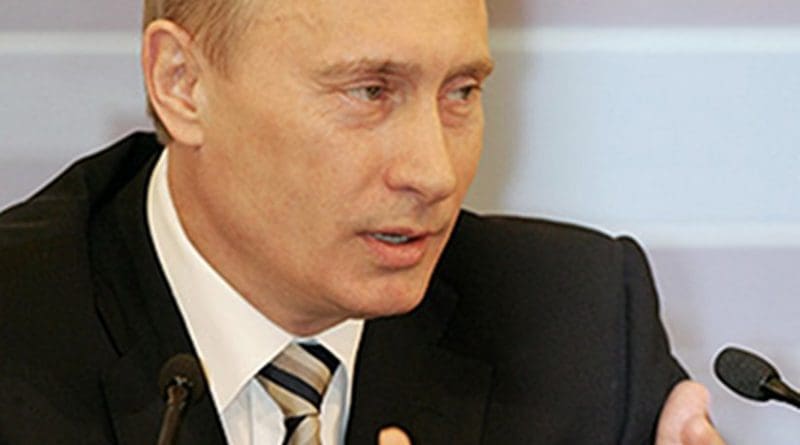I Beg Your Pardon, Mr. Putin – OpEd
Russian President Vladimir Putin pardons political prisoner Mikhail Khodorkovsky who was once the richest man in Russia and major opponent. Khodorkovsky was the number one oil tycoon of a monopolistic Yukos that was broken up and sold into piecemeal mainly becoming part of the state. He has been in prison for ten years.
The gesture comes just before the 2014 Winter Olympic games in Sochi, Russia (February 7-23). This high profile presidential pardon enters into effect after a recent increase of humanitarian abuses, fresh political detentions, less free speech and organization, a posthumous trial, diplomatic harassment, and anti-gay legislation that Western governments and activists repeatedly criticized.
Other benign offerings included were: the band members of Pussy Riot and the 30 Green Peace activists protesting Russian oil drilling practices in the Arctic. There are a total of 2,000 on an approved list that passed through Russian parliament unanimously.
All it takes is an Olympics and a lot of bad press build-up. After that, states like the larger, well established regimes of Russia and China begin to liberalize their active policies to make way for the open international games and the flood of money, status and attention. China, too, took many measures to accommodate Western and liberal concerns.
Such non-Western states put on the charm defensive in front of the world as they are opened up through the media. They take measures so they ‘appear’ better and they do go out of their way to be better, for a short time. Things like protest zones are set up for the Olympics by these regimes that would not otherwise be there too. But in the background, activists are being harassed and intimidated by government authorities to stay quiet during the Olympics and not make trouble for the regime. Thus, there is also a strategy at work here, not a total short-term concession. Putin’s regime is both using a disarming tactic, applied to the West, who can no longer play a loud trumpet of human rights abuses and he is at the same time threatening other activists in an attempt to completely remove this stain and on-going issue from Russia.
Unfortunately, any charm defensive does not last very long. Soon, such regimes are at it again. Too much power at the top; too centralized; too removed from the people and closed to the world of light. Moreover, the Olympics take place once every two years on-and-off for the Sumer and Winter Games.
What the West could do is engage in more non-violent forms of national competition. Modernizing this structure could take place on all levels. The Olympics could also be annual, with the addition of in-between activities and events. Digital games, for example. Diplomacy and military gaming could be open in international events and state-on-state aggression could turn to an indirect non-violent event that forms greater cooperation, rather than hostility and separation.
In any case, the Olympics Committee must also continue to press for liberal values and standards and reignite the 1948 UN Universal Declaration of Human Rights. In fact, it is always interesting to note that of the nine drafters on the original committee, one was from China (Dr. Peng-chun Chang), one from the USSR (Alexandre Bogomolov) and another from the US (Eleanor Roosevelt).
The Universal Declaration Principals are of course modeled after the US and European moral and political value system established before and around the time of the American [liberal] Revolution. They include the notions of “equality and inalienable rights” in the promotion of “freedom, justice and peace” in the world.
It might be possible to let the governments continue to function as they will but require of them and keep them accountable the highest standards of liberalism rather than democracy. Let them rule as they may but never abuse their people. If Russia wants a system of blat or China, for example wants the familiar cultural government system of guanxi and patron-client, let them; so long as they are benevolent and improving first. The other option is to manipulate them indirectly to establish subversive democratic movements. Both are difficult and all rely on a better understanding of the grass-roots cultural political cultural and value system. Increasing this to the level of the Universal Declaration of Human Rights will be decades of hard work in the making. However, so long as self-interested, aristocratic, racist and or criminal regimes are not directly threatened, they will likely pursue a course of greater benevolence, if they can be convinced that such political reforms will not affect their power and deep rooted traditions in any unstable way of order.
It would be naïve to assume any democratic process would naturally arise or that liberalism will spontaneously blossom on its own. A multi-method approach to spreading the values of Western conceived liberalism must first integrate with the conditions of culture and politics in-country and on the ground, wherever this may be. The West will continue to be impatient and demanding but should not over-due it. As mentioned, empirically, it is simple: when the light of liberty and free information flow enters a dark, cold and controlling country, the darkness of tyranny scatters and the once tyrannical state puts on a grand hosting display of warm smiles and liberal gestures. It will not make the blind see or the lame walk, but it can if prolonged move a state closer in a more humane direction.
*First published by In Homeland Security.

